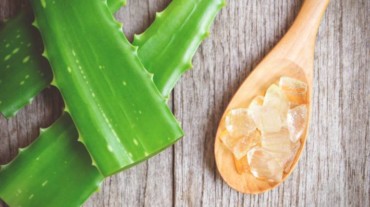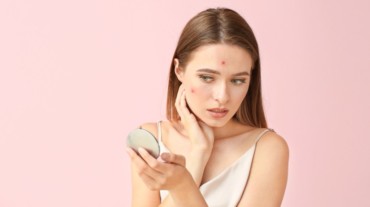Breakouts may occur as a result of increased sweating! How can pimples be treated quickly? Try these 7 home remedies instead of popping them.
-
Aloe Vera
This summer’s skin issues can often be resolved with the aid of aloe vera gel, a herbal remedy. Using plain ol’ aloe vera gel has a ton of advantages. It has natural anti-inflammatory and antibacterial properties, as per Dr. Bangia, and has a very low risk of causing irritation or negative side effects.
Simply combine 1 tablespoon each of aloe vera gel, cinnamon, and honey in a bowl. To create a smooth paste, thoroughly combine the ingredients. Apply it frequently to your skin.

-
Tumeric
Turmeric is a fantastic spice. Its anti-inflammatory qualities and antioxidant composition can help to lessen acne whenever it comes to the skin. By giving your face a glow, it can also aid in fading the appearance of dark spots, scars, and blemishes.
To use it, put a tiny pinch of organic turmeric powder and a tablespoon of honey in a clean, dry bowl. After thoroughly combining, add 3–4 drops of castor oil. Apply this paste to your face after storing it in the refrigerator for 10 to 15 minutes to cool. After 20 minutes, remove it by rinsing your face.
-
Apple cider vinegar (ACV)
Dr. Bangia claims that ACV contains organic acids such as citric acid that have been shown to kill acne-causing bacteria and propionibacterium acnes. However, you should use caution when using the product as it may irritate some people. As a result, always run a patch test first. Also, prior to applying it topically, ensure to dilute it with water.
-
Neem
Neem is often used as a skin-healing remedy. Neem is a great option for deterring breakouts in the summer because it has a high vitamin E content, calcium content, antioxidant properties, and antibacterial properties. In addition, it is a natural antibacterial, aids in moisturizing the skin, boosts collagen production, and can give your face a healthy glow.

To use it, simmer a few neem leaves in five cups of water for an hour over a very low flame. Give it a night. The following morning, strain the water and blend the leaves into a paste. Use it on the impacted areas. And then leave it on for 15-20 minutes before washing it off with warm water.
-
Tea tree oil
For skin that is prone to acne, tea tree oil is a fantastic antibacterial. Tea tree oil can be applied as a spot treatment for acne, according to Dr. Bangia. Tea tree oil has the benefit of being almost as efficient as some other topical acne treatments without the risk of bacterial resistance and other undesirable side effects such as irritation.
2–3 drops of rosemary oil, 5 drops of tea tree oil, 10 drops of rosewater, and 4 tablespoons of aloe vera should be combined to form a paste. The ingredients should be combined. Apply it to your skin after that, and leave it there for 10 minutes. Use lukewarm water to rinse.
-
Sandalwood
Boils, acne, and zits can all be treated with sandalwood paste. Antioxidants found in abundance in it protect against the harm done by free radicals. Additionally, sandalwood is renowned for its healing abilities that can reduce the occurrence of eczema, scars, and other skin conditions. It can also be used to even out skin tone and remove impurities from the skin.

To use it, make a paste with 3 tablespoons of sandalwood powder, 1/2 teaspoon of methi seed powder, 1 teaspoon of cinnamon (dalchini) powder, some lemon juice, and honey. It must be a paste that sticks. Apply it to acne or pimples, and leave it on overnight or for several hours.
-
Green tea
Due to the presence of anti-inflammatory and antibacterial polyphenols, which are present in green tea, this morning’s beverage can also be a helpful adjunct in the treatment of acne. Green tea can be consumed orally, and its extract can also be applied topically. Due to its antioxidant content, green tea extract can be applied topically to reduce sebum production and, consequently, acne.
